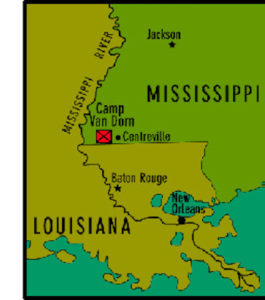
On this date in 1943, a Black soldier of the 364th Army infantry was killed on an Army base in Mississippi.
This was the beginning of the loss of 1,227 Black soldiers during World War II on that American base. The 364th was an all-Black regiment of soldiers stationed in Centreville, Mississippi, a Jim Crow community of the South. At that time, the Army had begun intensifying its efforts to recruit Blacks but was still racially segregated. The few Black regiments designated for combat were typically under-trained, under-supplied, and sent to stations where they were isolated and subject to insult and attack from hostile white civilians.
The 364th arrived at Camp Van Dorn in two groups on May 26 and 28, 1943. On May 29, 1943, a Black soldier, Pvt. William Walker from the regiment was detained by a military policeman and questioned about his improper uniform and lack of a pass, resulting in a fight. The county sheriff arrived, and the private attempted to flee and was shot and killed by the sheriff.
Shortly after, a supply room was stormed by men of another company of the same regiment, where they took several rifles. A crowd gathered near the regimental exchange, and a riot squad of Black military policemen fired into the crowd. One soldier was wounded by this exchange.
The Army's high command in Washington, D.C., warned base and regimental commanders that they were to end racial violence or lose their jobs. What followed the 364th rally and cry is subject to conflicting reports. Allegations range from minor skirmishes and disciplinary action to wholesale slaughter. The 364th's Morning Reports, a company-by-company daily attendance sheet, noted dozens of soldiers as AWOL following the Walker shooting and its aftermath. Files in the National Archives trace some who made their way north, seeking asylum from their local induction board from what they called a life-threatening situation.
In December 1943, the remaining men of the 364th were relocated to a camp in the Aleutian Islands. It was then that their personnel roster began to show signs of loss. Records showed around 1,000 3,000 men left the 364th at the war's end. In other words, from June 1943 until Japan's surrender, about one soldier's name per day disappeared from the 364th's roster. Mississippi Congressman Bennie Thompson and the NAACP, fearing a massacre had occurred at Centreville, investigated the issue. The Army devoted thousands of hours and dollars to explain the massive losses.
A report was issued on Dec. 23, 1999. It stated: "There is no documentary evidence whatsoever that any unusual or inexplicable loss of personnel occurred." Inconsistencies in the Army's report have diminished its credibility, leaving unanswered the same haunting questions that many have been investigating for years.
Organizational History Branch
U.S. Army Center of Military History
103 Third Avenue
Fort McNair, DC 20319-5058